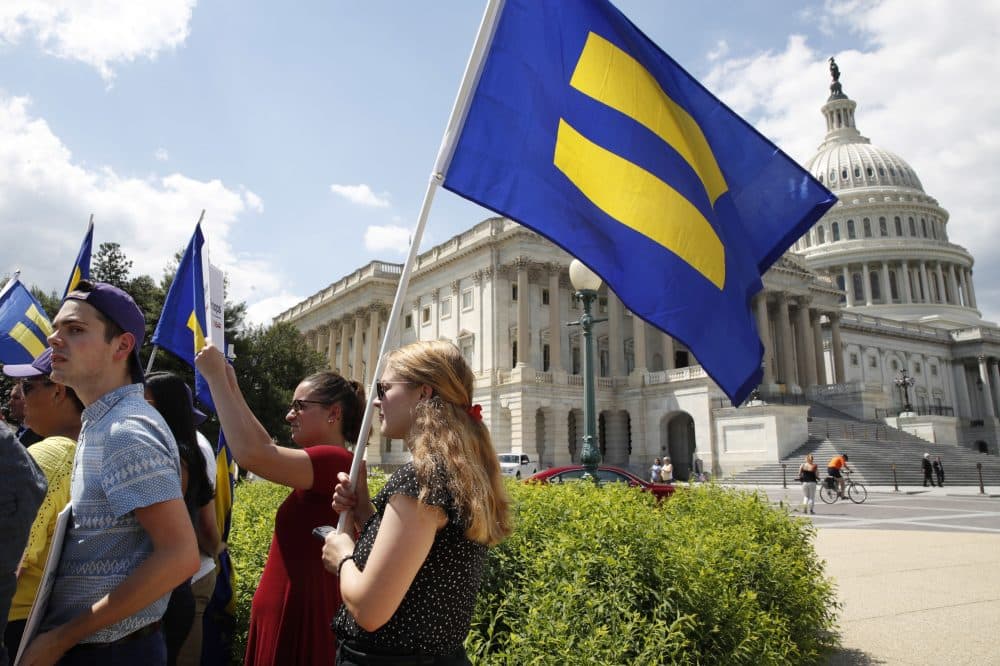Advertisement
Commentary
What Trump’s Ban On Transgender Troops Really Means

Citing medical costs and unspecified “disruption,” President Trump yesterday announced that transgender service members would no longer be welcome in the U.S. military.
Characteristically, this major policy decision was broadcast via Twitter, a platform whose character count limit robs our commander-in-chief’s proclamations of any semblance of nuance — something he has thus far appeared incapable of providing on any issue.
The move, coming as the administration is mired in an ongoing health care debate, an investigation into the administration's relations with Russia in which the president has reportedly expressed interest in firing the special prosecutor and a burgeoning feud between Trump and his attorney general, reeks to me of naked misdirection. The storm of responses and outrage it has created appear to have served as a useful distraction for this beleaguered White House.
This is not to say that the ban is by any means benign.
The president’s manic tweets yesterday struck a blow to the inclusivity of our all-volunteer forces, a point forcefully argued by retired Navy admiral John Kirby and retired Army general Mark Hertling in a piece for CNN.
We have come to take for granted the professionalism of the armed forces in this country.
There is, however, another way in which the effects of President Trump’s transgender ban could be far more pernicious for the security and stability of democracy in the United States moving forward.
We have come to take for granted the professionalism of the armed forces in this country. While it is never a perfectly achieved ideal, the U.S. military from the second half of the 21st century through today has largely managed to limit high profile rows with the political establishment. This level of apoliticism among the uniformed services is absent even in some liberal democracies, let alone countries such as Turkey or Pakistan, where the militaries have frequently interceded in the political process, often overriding or unseating duly elected officials.
It is hard to overstate the degree to which then-candidate Trump crossed a political Rubicon when he openly feuded with the parents of an American soldier killed in action. The clash provoked harsh responses from many current and former members of the military.

With this latest affront to a subset of the armed forces, media outlets have scrambled to record the reactions of transgender troops. These service members are then cheered by the president’s political opponents and held up as examples of model patriots.
While the umbrage taken by these individuals is both understandable and justifiable on a personal level, the repeated crises brought about by the president’s rhetoric and flippant policy decisions are teaching the military bad habits.
The security of the American republic is predicated entirely on firm civilian control of our armed forces, and this is embodied by the president’s role as commander-in-chief. When soldiers are openly criticizing the president, the entire supposition of this dynamic is undermined. When the opposition normalizes this behavior by using the words of these service members against him, essentially endorsing this breach of protocol, the entire system is jeopardized.
President Trump is playing Russian roulette with the system that has kept our armed forces accountable to elected officials.
The blame for the precariousness of the current civil-military relationship lies squarely on the president. His disinterest in foreign policy has given generals free reign in overseas conflicts. He has encouraged members of the military to lobby legislators on behalf of his agenda. These actions, along with his flirtation with controversial policies such as this latest ban, are undermining the norms that have kept our armed forces subservient to the political process, and also undermining the good order and discipline incumbent on all uniformed personnel. Who is to say that the Pentagon will be able (or willing) to return to business as usual under a future president?
The aphorism made famous by Carl von Clausewitz that “war is politics by other means” is being flipped on its head by our chief executive. Politics has become war by other means — and a total war at that — in which the president is prepared to jeopardize the professionalism of our armed forces.
President Trump is playing Russian roulette with the system that has kept our armed forces accountable to elected officials. There may be a variety of reasons for his political game — from apathy, to political gain, to sheer diversion. Regardless of the motivations, the nihilism and reckless self-interest behind these decisions are unprecedented in modern American politics, and should be concerning to everyone who believes in our system.
